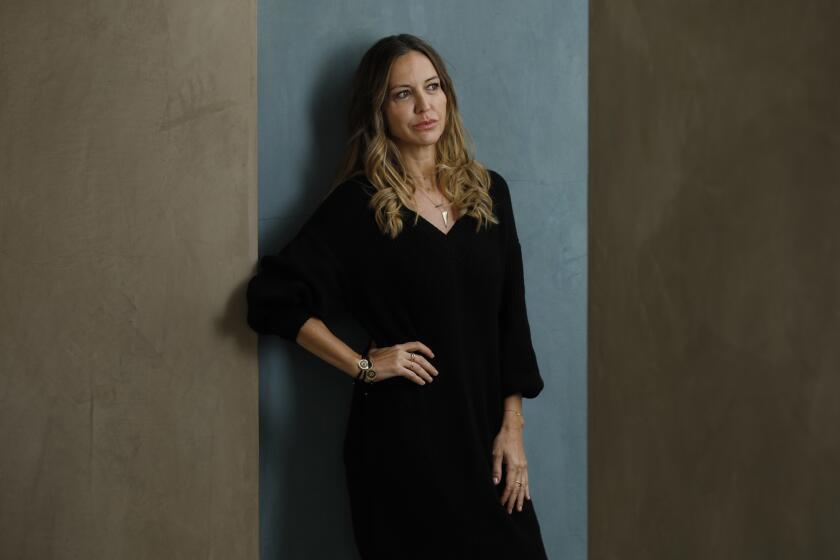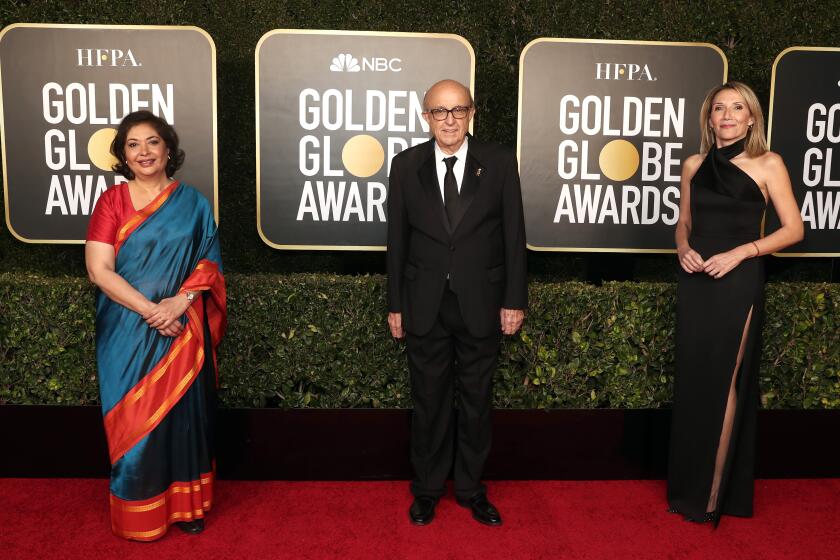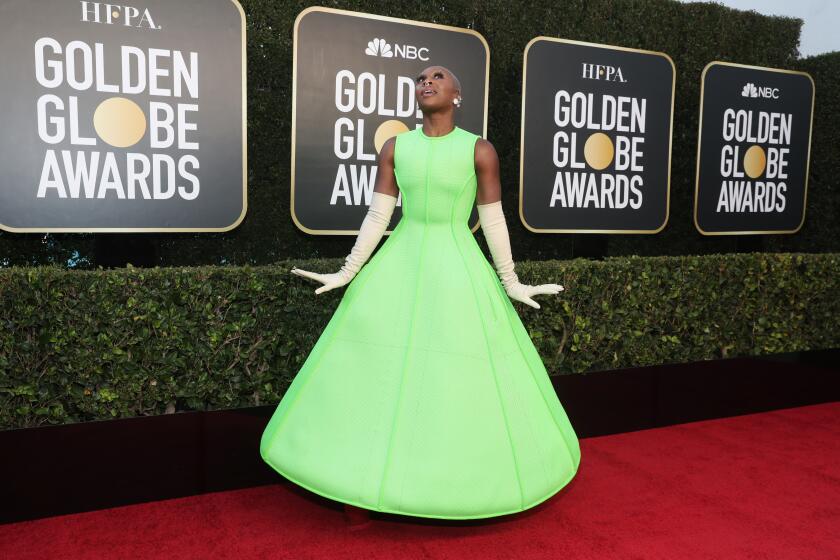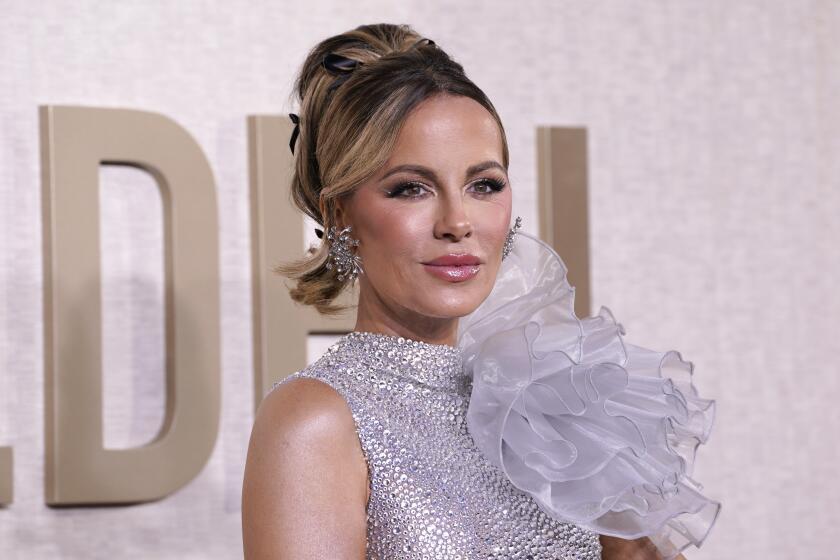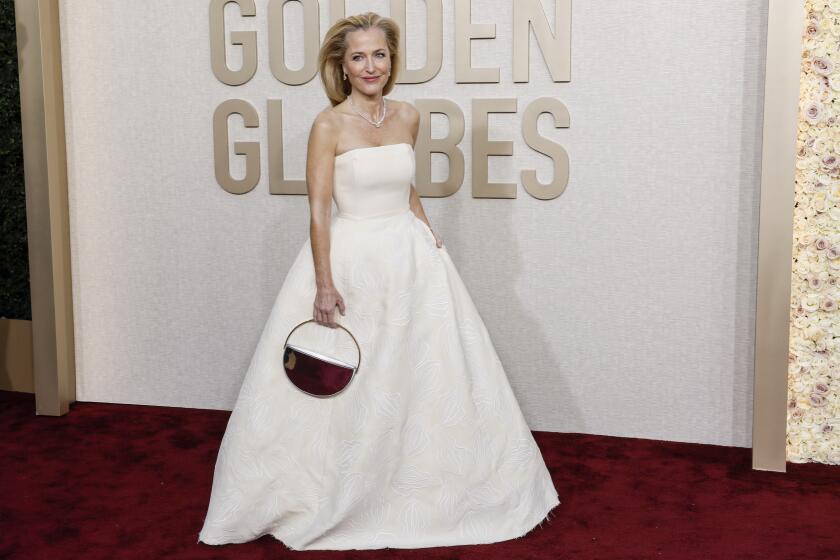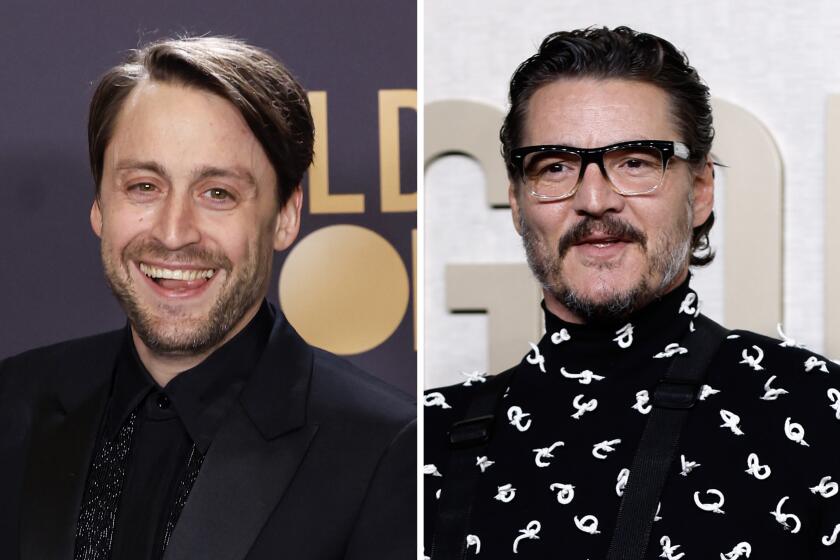‘Nomadland’ and ‘Borat Subsequent Moviefilm’ win at Golden Globes, as HFPA tries to move past controversy

Although the freewheeling Golden Globes has long been billed as “Hollywood’s Party of the Year,” the 78th edition of the awards telecast held Sunday proved to be something very different — and decidedly less festive.
The virtual ceremony’s usual razzle-dazzle was dimmed by the COVID-19 pandemic, with the red carpet nearly barren and boozy bonhomie replaced by Zoom glitches. Adding to the sense of somewhat forced cheer, the show followed a week of mounting controversy sparked by a Times investigation into the membership and ethics of the Hollywood Foreign Press Assn., the 87-member group of international journalists that doles out the awards.
Facing blistering criticism after The Times highlighted that the organization has no Black members, the HFPA used the occasion both to deliver its latest awards — with “Nomadland” and “Borat Subsequent Moviefilm” winning the top best picture prizes in the drama and comedy or musical categories, respectively — and to acknowledge its failings on the issue of diversity.
“Tonight, while we celebrate the work of artists from around the globe, we recognize we have our own work to do,” said the group’s vice president, Helen Hoehne. “Just like in film and television, representation is vital. We must have Black journalists in our organization.”
Added former president Meher Tatna, “We must also ensure everyone from all underrepresented communities gets a seat at our table, and we are going to make that happen.”
The organization said the perception that many members are not serious journalists is “outdated and unfair” and that it is committed to addressing the lack of Black members.
The entirety of the response was six sentences split among three people and took up under a minute of the three-hour show. The HFPA, which has historically kept its membership strictly limited in size, offered no concrete plan during the show to address the inclusion issue. Nor did it address other criticisms that have been raised, including from some of its own members, over its alleged ethical lapses.
Just minutes after the show ended, Time’s Up President and CEO Tina Tchen sent letters to the HFPA and NBC, decrying the group’s response as “cosmetic” and calling for further reforms.
“If the HFPA understood the social reckoning of these times, it would not have needed an LA Times exposé followed by negative global press and a pummeling on social media to announce a commitment to change,” Tchen wrote in the letter addressed to NBCUniversal executives Mark Lazarus and Susan Rovner.
“We recognize the significance of the Golden Globes to the awards season,” Tchen continued. “But a claim to significant real estate is not an exemption from a lack of obligation to the ethical standards that the industry is embracing. To the contrary, it is your obligation.”
NBCUniversal could not immediately be reached for comment.
In their opening monologue, co-hosts Tina Fey and Amy Poehler — on stage in New York and L.A., respectively — cracked that awards like the Globes are “all a scam invented by Big Red Carpet to sell more carpets.”
Still, Fey went on, “The point is, even with stupid things inclusivity is important, and there are no Black members of the Hollywood Foreign Press. I realize, HFPA, maybe you guys didn’t get the memo because your workplace is the back booth of a French McDonald’s. But you’ve got to change that.”
Although the HFPA has weathered a string of scandals throughout its history and been mercilessly mocked from its own awards stage, the run-up to this year’s Globes brought an awards-season PR crisis unlike anything since the #OscarsSoWhite firestorm rocked the film academy in 2016.
The outcry over the HFPA’s lack of Black members further fueled criticism of this year’s Globes nominations, which didn’t include any of the year’s Black-led awards contenders, such as “Da 5 Bloods,” “Ma Rainey’s Black Bottom,” “One Night In Miami ...” and “Judas and the Black Messiah,” in the finalists for best picture. On the TV side, acclaimed work including the HBO limited series “I May Destroy You” and the diverse ensemble casts of Netflix’s “Bridgerton” and HBO’s “Lovecraft Country” were also overlooked.
The fallout over the HFPA’s lack of Black members continues publicly and behind the scenes.
Just days before the ceremony, even after the group vowed to “bring in Black members,” Hollywood power players including “Selma” director Ava DuVernay, TV producer Shonda Rhimes, actress Kerry Washington and others shared the hashtag #TimesUpGlobes on social media to protest the group on the issue of inclusion. Hours before the telecast, the guilds joined the chorus, with SAG-AFTRA releasing a statement saying, in part, “If the HFPA is to remain relevant in today’s media environment, it must fully embrace inclusion among its membership and across its operations.”
But despite the social-media fury in the run-up to the show, the evening’s starry parade of presenters, nominees and winners and general show-must-go-on spirit underscored the industry’s deep and enduring ties to the Globes. Winners politely offered thanks to the HFPA (accepting the prize for “Borat,” Sacha Baron Cohen directed his to “the all-white Hollywood Foreign Press Assn.”) and references to the controversy from those in attendance were few and mostly indirect and gentle. (“It’s great to be Black at the Golden Globes,” said presenter Sterling K. Brown, who days earlier posted on Instagram that the HFPA’s lack of Black members “illustrates a level of irresponsibility that should not be ignored.”)
One year after the group drew fire for not nominating any female directors, the HFPA nominated three women in the category: Chloé Zhao (“Nomadland”), Regina King (“One Night in Miami ...”) and Emerald Fennell (“Promising Young Woman”). With the win for her poetic drama set starring Frances McDormand as a woman drawn out onto the road in search of work, Zhao became the first woman to win the directing Globe since Barbra Streisand won for her 1983 film “Yentl.” (Kathryn Bigelow is still the only female director to win the Oscar, for “The Hurt Locker” in 2010.)
Though the HFPA’s picks have often proved befuddling to critics (Fey dismissed Sia’s widely panned “Music,” which earned a best picture nod in the comedy or musical category, as “best international flop-arooni”), the Globes have become a critical marketing tool for Oscar hopefuls. Studios and networks collectively spend millions annually to try to woo HFPA voters — and as The Times investigation showed, the HFPA accepts and even demands such wooing in ways that continue to raise ethical questions.
A Times report highlighting ethical lapses and the lack of Black members in the Hollywood Foreign Press Assn. has drawn widespread attention. Now Time’s Up is joining those calling for more action.
Glancingly nodding to such criticisms, Fey told viewers who might be unfamiliar with the HFPA that it is a group of “international non-Black journalists” who “attend movie junkets each year in search of a better life.” Addressing criticism of the group’s nomination of Netflix’s “Emily in Paris” for best comedy series — which, The Times reported, followed a Paramount Network-subsidized set visit in Paris attended by more than 30 HFPA members — Fey referenced the title of the indie comedy that earned Michelle Pfeiffer a best actress nom: “ ‘French Exit’ is what I did after watching the first episode of ‘Emily in Paris.’ ”
The HFPA has said that none of the allegations raised by The Times — or in a recent antitrust lawsuit against the group by Norwegian journalist Kjersti Flaa — “has ever been proven in court or in any investigation” and has called the idea that the group is unduly swayed by lavish, studio-funded junkets, exclusive access to stars and other perks “absurd.”
With the Oscars delayed by the pandemic to April 25, the Globes kick off an awards season — and cap a year for the film industry — that has been thoroughly upended, if not decimated, by the coronavirus crisis. Many of 2020’s bigger would-be contenders were pulled by studios from the release calendar to avoid certain box-office doom, allowing smaller, less widely seen films room to shine.
Although the socially distanced format added a degree of awkwardness to stars’ acceptance speeches (Jason Sudeikis, winning the lead actor in a comedy award for the Apple TV+ series “Ted Lasso,” delivered his in a hoodie), a few hit emotional notes. In the evening’s most moving moment, Chadwick Boseman’s widow, Taylor Simone Ledward, tearfully accepted the lead actor in a drama award on behalf of her late husband for his work in “Ma Rainey’s Black Bottom.”
With movie theaters closed, TV fueled much of the awards chatter heading into the Globes. Netflix topped its competitors with six wins on the TV side, largely thanks to a buzzy fourth season of “The Crown.” The royal drama nabbed four prizes, including best drama and lead actor and actress wins for Josh O’Connor and Emma Corrin for their performances as Prince Charles and Princess Diana, respectively. “The Queen’s Gambit,” the chess drama that had been one of the streamer’s breakouts during quarantine, received two prizes, including limited series and lead actress in a limited series for Anya Taylor-Joy.
It is still far from clear how — or whether — the HFPA will work to address the knotty issues raised about the group in the past week — issues that, in their broad strokes, have been widely known and tolerated by Hollywood for decades. But judging from the evening’s proceedings, the industry appears determined to give the HFPA time to undertake reforms, even as it’s been put on notice that reforms are needed.
“I hope that this time next year this ceremony reflects the true breadth and diversity of the film and television being made today,” said Dan Levy, accepting the comedy series award for “Schitt’s Creek.” “Because there is so much more to be celebrated.”
In her letter to NBC, Tchen was more blunt and urgent: “The Globes are no longer golden. It’s time to act.”
Times staff writer Yvonne Villareal contributed to this report.
More to Read
The biggest entertainment stories
Get our big stories about Hollywood, film, television, music, arts, culture and more right in your inbox as soon as they publish.
You may occasionally receive promotional content from the Los Angeles Times.
